At Thursday night’s final presidential debate, Kristen Welker asked President Trump a pointed question about the economic hardship caused by the coronavirus pandemic. “As of tonight, more than 12 million people
are out of work,” she said. “Eight million more Americans have fallen into poverty, and more families are going hungry every day. Those hit hardest are women and people of color. They see Washington fighting over a relief bill. Mr. President, why haven’t you been able to get them the help they need?”
“Because Nancy Pelosi doesn’t want to approve it,” Trump replied. “I do.”
Welker didn’t let him off the hook. “But you’re the president.”
It was just one impressive moment in a stand-out night for Welker, who used her perch in the moderator’s chair to facilitate a debate that — unlike the first chaotic showdown — was...actually watchable. Poised and in-control, she asked sharp questions, allowing the candidates time to respond while also making sure the night stayed on track. “Gentleman,” she repeatedly requested when the candidates filibustered, “we need to move on.”
“I just kept saying to myself, ‘listen and be present,’” she tells ELLE in an exclusive interview. “I thought it was critical that we talked about the issues that mattered to voters, and I wanted the questions to be accessible. I wanted them to be meaningful to people.”
Welker, the first Black woman to moderate a presidential debate since 1992, was roundly applauded for her performance. “I think if there was a clear winner from this debate tonight,” said MSNBC’s Rachel Maddow, “it was, in fact, Kristen Welker.” Said one reporter: “This should be the tape future debate moderators study and seek to emulate.” Another said simply, “Kristen Welker, take a bow.”
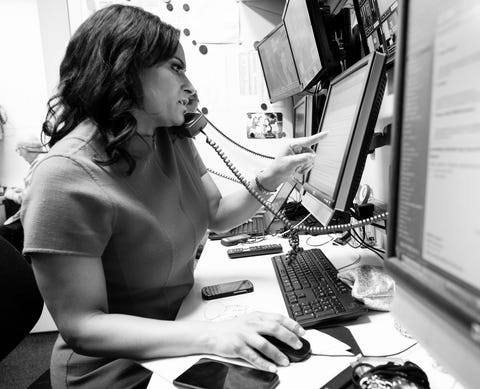
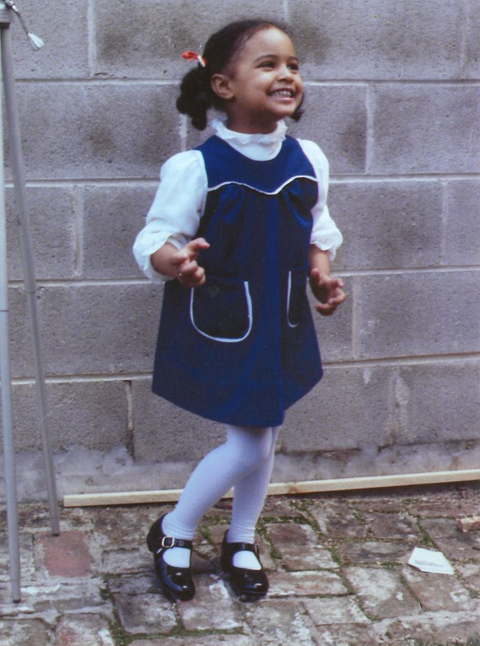
Welker says she knew she wanted to be a journalist when she was in sixth grade. Growing up in Philadelphia, she would watch pioneering female reporters like Mitchell and Barbara Walters and think, “If you could talk to the people who are literally making history, who are in the front row of events as they unfold, that would be the coolest job in the world.” She penned an advice column in her junior high newspaper, and once wrote a fervent opinion piece about why the school cafeteria needed a frozen yogurt machine.
“She was the type of person who would stand up for someone else,” recalls her mom, Julie. “And she would stand up for herself. But if someone else was being treated unfairly, she felt as strongly about that as if she were being treated unfairly.”
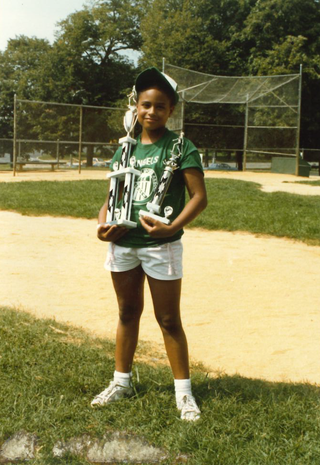
Given that her entire job is to ask tough questions, you’d think she would never get nervous, right? Wrong. She says a little bit of nerves are actually a good thing. “If you don’t have that feeling of being a little bit nervous about it, you have to ask yourself, have you really found the toughest question you can ask?”
“If you don’t have that feeling of being a little bit nervous about it, you have to ask yourself, have you really found the toughest question you can ask?”
In the weeks leading up to Thursday, she called voters around the country and asked them what they wanted answered. She did mock sessions where she workshopped questions and practiced how to politely move the candidates along. She spent hours diving into the issues with her team of researchers and writers. She also called the moderator of the first debate, Fox News’s Chris Wallace, to get his advice. That spectacle, she says, made her “think very seriously about the role of a moderator and what my tone would be.” Throughout her weeks of preparation, though, her goal stayed the same. “My strategy going into this was, how do we give the American people the information they need to have days before an election?”
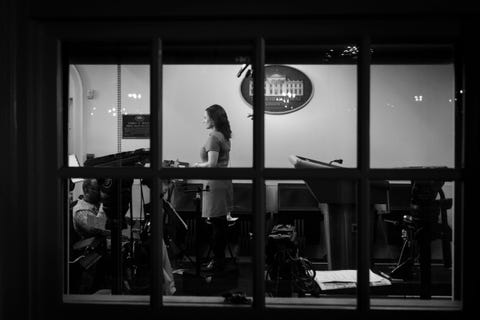
“Of course it never feels good to have people talking about you,” she says. “I had to tune it out.” To do that, she gave her phone to her husband and one of her producers. “If I needed to know something, they let me know about it. Otherwise, I had to stay focused because I didn't have time to get distracted.”
In her questions Thursday night, Welker — the only woman and person of color tapped to moderate a presidential debate this cycle — made clear the importance of representation in journalism. She posed the only question in the debates about child separation at the border, asking Trump how the parents of more than 500 migrant children taken from their families will be found. (After repeated follow-ups, Trump said he was “trying very hard” to find them.) She noted that people of color are much more likely to live near oil refineries and chemical plants. And in one particularly significant moment, she asked Biden about “the talk” that all black and brown parents have with their kids about how to behave so police officers won’t shoot them.
After she got the call to moderate, she says, that was the first question she wrote. “I wanted people to feel like this was accessible to them, that this was not a discussion that people who work in Washington were having. I thought that was an important way to capture this moment that many people of color feel is a moment of crisis, and to get at the heart of that.”
She saw the importance of having a diverse set of perspectives in the press corps from a young age. When she was in high school, her mom ran for city council in Philadelphia. Welker sat in on political meetings and strategy sessions, as well as press conferences where reporters questioned her mom, who’s black, about her marriage to her dad, who’s white. “I just thought, ‘Wow, it really matters who asks the questions,’” she recalls. It’s crucial, she says now, for newsrooms to reflect their audiences.
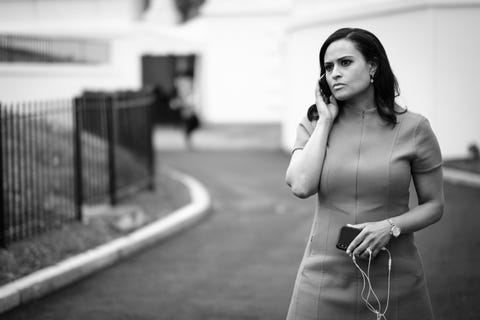
The consequences of a lack of newsroom diversity have affected her. In her first few months at a small local station early in her career, she was driving with a photographer while covering a story. “You know,” he said, “you got the Black position.” Apparently, she’d replaced the one other Black reporter. Welker was appalled; she’d worked hard and earned the job. When they stopped driving, she says, she went to the bathroom and cried. After she’d calmed down, she thought, “I can handle this in one of two ways. I can be really upset, or I can try to help him understand that of course you should want there to be more diversity in the newsroom.” In the months that followed, she “really tried to instill in him, yes, of course I’m a journalist of color and I’m so proud of that, but I’m also someone who takes journalism really seriously.” By the end of her time at the station, her talent and work ethic had impressed him: He told all the new reporters, “You’ve got to learn to do what Kristen does. She does it the best.”
Now, she feels a deep sense of responsibility to help other women of color coming up in the industry. She makes a point of reaching out to new hires at NBC to tell them she’s a resource, passing on what she’s learned over decades in the business. Women of color, she says, need support at all levels of the industry. “Not just saying, ‘Hey, hopefully you can swim in this big sea,’ but to say, ‘OK, let’s actually make sure there are mentors. Let’s make sure that we're developing our talent, both in front of and behind the camera at every step of the way so that we’re representative of the world that we are representing.’”
"I wanted people to feel like this was accessible to them, that this was not a discussion that people who work in Washington were having."
That impulse to support others, friends say, is integral to Welker’s identity. “She’s such a generous colleague,” says Mitchell. “I can’t tell you how often we’ll both be working through a story and she’ll say, ‘Can I do anything for you? Can I help you?’ without hesitation.”
Amid the chaos and disinformation of this election cycle, Welker is keenly aware of the crucial role of journalism. “It’s hard to see this moment as anything other than an inflection point,” she says. “The weight of that sits on my shoulders every morning when I wake up, and reinforces that it’s so important that we, as journalists, get it right, and that we’re meeting this moment — for now, for the voters, and for the generations to come.”


